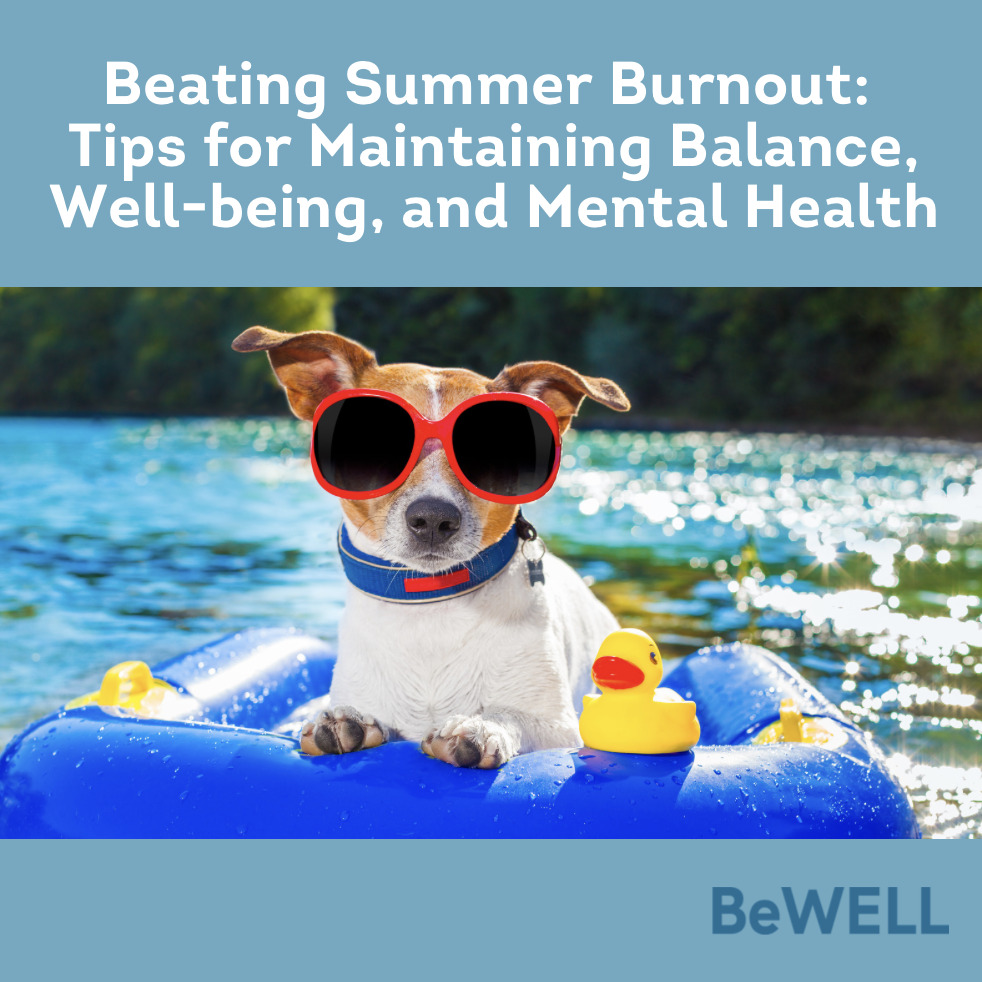Beating Summer Burnout: Tips for Maintaining Balance, Well-being, and Mental Health
By: Cristin Van Horn
As the days grow longer and brighter, and we welcome the warmth of the summer season, it’s easy to overlook the potential pitfalls that can accompany this time of year. One such challenge is “summer burnout,” a phenomenon characterized by increased mental and physical fatigue, a sense of being overwhelmed, and a decline in overall wellbeing. At BeWell, we prioritize holistic and integrative mental health wellness, and we recognize the importance of adopting a comprehensive approach to safeguarding against summer burnout. Keep reading as we look into the essence of summer burnout, explore how to prevent it, and offer our top tips for maintaining balance and mental health this summer.
Understanding Summer Burnout: Why & How Summer Burnout occurs
Summer burnout often stems from the pressures and heightened expectations that we associate with summer—the pressure to enjoy the sunshine, participate in outdoor activities and events like beach days and bbq’s, and attend social gatherings. The challenge is exacerbated by pre-existing factors such as work, household tasks, and family obligations. These pressures often stress us out, rather than actually help us enjoy the season. And when this cumulative stress becomes too much, it can lead to summer burnout.
Seasonal Factors
- Longer daylight hours: Extended daylight hours often encourage us to fill our days with activities, leading to over-commitment and exhaustion. For example, a working parent might be juggling their job, childcare, and family outings to parks and beaches, leaving them stretched too thin and vulnerable to burnout.
- Heat and humidity: The rising temperatures and humidity that accompany summer can lead to physical discomfort, dehydration, and a general sense of exhaustion. Those of us who work, or spend a lot of time outdoors, not only have to perform daily duties but also withstand the summer heat—naturally, over time, this may result in burnout.
Expectational Factors
- Idealized summer experiences: Society often bombards us with portrayals of idyllic summers made up of vacations, adventures, and relaxation. These images place undue pressure on us to achieve “the perfect summer.” You might feel compelled to attend dozens of social gatherings, manage elaborate holiday plans, and squeeze in various outdoor activities, creating the perfect storm for burnout.
- Busy social calendar: Summer is often marked by a spike in social events such as weddings, barbecues, and outdoor festivals. These events might hold great appeal, but trying to attend them all while juggling daily responsibilities can lead to feelings of burnout. You and your partner might be attending several weddings and other summer celebrations, while still striving to find harmony between work and family life, which may take a toll.
What Does Summer Burnout Look and Feel Like?
Summer burnout can differ from person to person, but a few common signs and symptoms include:
- Mental fatigue: You may find it challenging to concentrate or make decisions, as well as experience a decrease in motivation and creativity.
- Physical exhaustion: Persistent tiredness or lack of energy, despite getting adequate rest, can be indicative of burnout.
- Emotional imbalance: Feelings of irritability, frustration, and impatience may start to show up, even if you typically keep your cool.
- Sleep disturbances: Difficulty falling asleep, waking up throughout the night, or experiencing an overall decline in sleep quality are potential signs of burnout.
- Social withdrawal: If you are suffering from burnout, you might retreat from social situations or feel overwhelmed by the prospect of attending events or interacting with others.
Tips for Preventing Summer Burnout
To truly enjoy the summer months, you have to address the issue of burnout proactively, before the burnout. Here are some tips for preventing summer burnout and maintaining balance, wellbeing, and mental health:
- Set Realistic Expectations: It’s essential to establish attainable goals that consider your circumstances, resources, and commitments. Be honest with yourself about what you can achieve in a day, week, or month, setting boundaries that prioritize your wellbeing.
- Embrace Self-Care: Prioritize activities and hobbies that will help you relax and recharge, such as fitness, meditation, spending time with loved ones, or taking an evening off for personal enjoyment.
- Organize Your Time: Structure your summer days around the Four Pillars of Mental Health Wellness, allowing each pillar the time it warrants. This could mean scheduling therapy appointments, practicing mindfulness, and genuinely engaging with your environment to create well-rounded wellness.
- Stay connected: Reach out to your friends and let them know how you are feeling, before it reaches a point that you feel is too much. As always, a BeWell therapist can help you navigate your thoughts and stress, and give you tools to help prevent you from burning out.
- Adjust Your Sleep Schedule: Longer daylight hours can make it harder to maintain a consistent sleep routine. Prioritize sleep by setting a schedule, limiting screen time before bed, and creating a calming atmosphere for restorative rest.
As we embark on this summer season, remember to keep an eye on your overall mental health and wellbeing. Prioritize your mental health and wellbeing so that you can thrive this summer—free from the burden of burnout!



